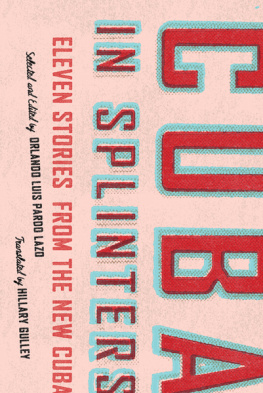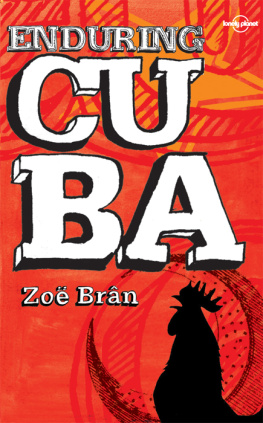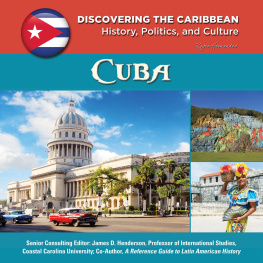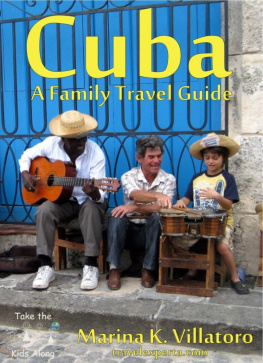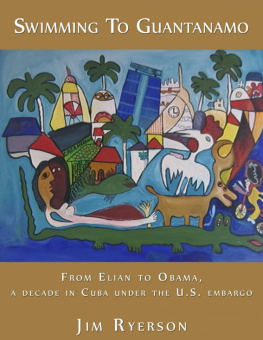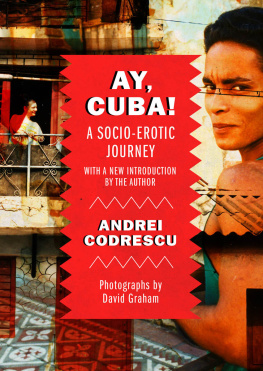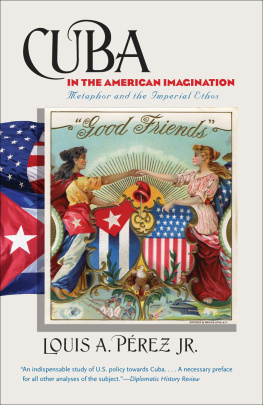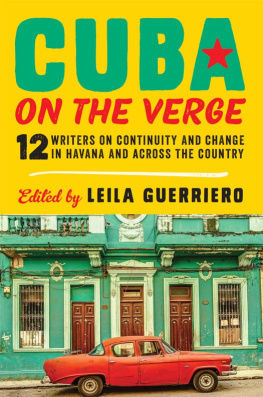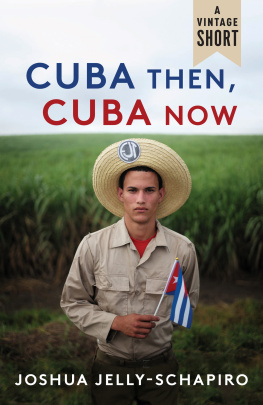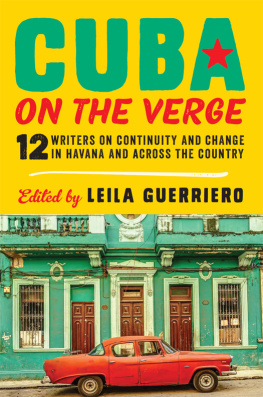
STUTTERERS AND ADDICTS, SEX AND KNIFE FIGHTS, ZOMBIES and lost literary classics all appear in Cuba in Splinters , an electrifying collection of eleven stories by a new crop of Cuban writers. Largely unknown in the U.S., on their home island theyve become known as Generation Year Zero, named for the early years of this millennium and the blank slate on which they scrawl their vision of a new national literature.
They are inspired by American writersBukowski, Kerouac, Millerbut the stories, here translated into English for the first time, are 100% Cuban. Take a stroll through a Havana steeped in decay, past oblivious drug-toting German touristsand beware of zombies masquerading as health inspectors.
Welcome to a raw island fantasy closed to the casual visitor.
Selection 2014 Orlando Luis Pardo Lazo
Individual stories 2014 the authors
English translation 2014 Hillary Gulley
For all rights information: rights@orbooks.com
Published by OR Books, New York and London
Visit our website at www.orbooks.com
First printing 2014
All rights reserved. No part of this book may be reproduced or transmitted in any form or by any means, electronic or mechanical, including photocopy, recording, or any information storage retrieval system, without permission in writing from the publisher, except brief passages for review purposes.
Cataloging-in-Publication data is available from the Library of Congress.
A catalog record for this book is available from the British Library.
ISBN 978-1-939293-48-0 paperback
ISBN 978-1-939293-49-7 e-book
Text design by Bathcat Ltd. Typeset by Lapiz Digital, Chennai, India.
Printed by BookMobile in the United States and CPI Books Ltd in the United Kingdom. The U.S. printed edition of this book comes on Forest Stewardship Council-certified, 30% recycled paper. The printer, BookMobile, is 100% wind-powered.
PREFACE
In the beginning there was the Revolution and the Revolution was Fidel
The year 2000 didnt mean the advent of a new century and millennium in Cuba. On the contrary, it meant the continuance of a paleo-historical process called The Revolution, capital T, capital R. In neon lights, with regard to the international academy. Perversely polarized and pop. With fireworks and firearms. Utopia embodied in a people despite its people. The same Revolution which, since long before its victory on January 1, 1959, confused part with whole and violently occupied every space in society, including its language, erecting a monolithic model, at the top of which still stands Fidel.
Fidel, no last name required. Sometimes euphonic, sometimes fossil, with its intimate and intimidating F. Perversely as elite as it is populist. Omniscient, ubiquitous, all-encompassing Fidel, the Ultimate Narrator of this totalitarian utopia that he has molded to his image and likeness. The Revolution, understood as a national narrative that distances us from the rest of the planetthe Doppler Defect. What has caused us Cubans to be less contemporary: strange vermin forsaken by God and capital. An experimental paradise for anthropological entomology. The Revolution, with its forced, even-handed alacrity, an ideological idyll which, in the twenty-first century, has yet to expire. Expirevolution. During a period that has already lost its own plot.
Wenn ich Kultur hre, entsichere ich meinen Browning
The literature of the Revolution always lacked imagination. I dont know if this was ever attributed to the economic, financial and commercial embargo imposed on our country by the United Statesalso privately known as the imperialist blockade. Literary rhetoric was therefore forced to adhere to a generic realism: a rosy realism, at times Russian. If literature was to be a weapon of the Revolution, then it had to be something that could be armed and disarmed by our most humble workers and farmers. In fact, Cuban literature was assigned the special mission of ceasing to be a spiritual luxury and humbly setting forth to create a literate populace. To be understood by everyone, especially the experts in the political police. This is why the original sin of our intellectuals, as an ex-social class, is that of never having been authentically revolutionary, according to the gospel of Ernesto Ch Guevara.
This sin must be radically atoned for, and the sooner the better. In the summer of 1961, Fidel stood at the National Library before hundreds of seated intellectuals, laid his fifteen-shot Browning on a desk and proclaimed: Within the Revolution, everything. Against the Revolution, nothing, allowing only for a residual outside freedom for those who didnt agree with him. With Him. It was clear that in a revolution like the Cuban one, literature was too serious a matter to be left to the men and women of letters.
Within literature, everything. Outside literature, nothing.
In the early 1990s, the fall of the Soviet Union and the European socialist countries put Cuba on the verge of famine and government concentration campsthe so-called Option Zero of the Special Period of War in Times of Peace. This debacle, however, also brought down the Sugar Curtain; Cuban artists felt the stirrings of liberation. The disassembling of centralized control mechanisms meant that, for the first time since 1959, writers could publish their work abroad without permission from the State. For the first time since 1959, the same State allowed writers to collect royalties without clearing bureaucratic hurdles and obtaining a surreal trust certificate. So literature assumed the role the imprisoned press could not, and anthologies of very critical writers were soon published, like that of the Novsimos generation: The Last Shall Be the First (Editorial Letras Cubanas, 1993), compiled by Salvador Redonet. Pandoras box was about to open.
The Paideia project, the La Azotea de Reina gatherings, the magazine Dispora(s) , among many other independent works, burst forth with an energy suppressed during decades of censorship. It was too much: the official reaction involved paramilitary forces from the political police. It was still unthinkable that there could be a literature independent of State Security, its agents being the specialized readers they were. Most of the main writers of this perestroikuba were coerced, blackmailed, fired, marginalized, beaten, jailed and obliged to choose between silence or exile. It was an exceptional victory for the cultural policy of the Communist Party (still the only legal political party in our country). In fact, at the beginning of the 2000s, the insular silence was fathomless. Almost none of those artists stayed in Cuba; they fled to fade away abroad, graciously. In the end, there was silence and exile. The change of century and millennium in Cuba didnt bring the 2000s, but the 0s. We had to start from zero.
Y2K
Generations dont exist. Generational illusion does. Generation Year Zero, therefore, can be no more than a band of outlaws, of electrons out of orbit, miracles of the marginal view, the residue of writers who didnt belong to the world of writers but to those of the sciences or the streets, and who therefore conducted themselves like squatters. Generation Year Zero is like an album of rare species in danger of extinction, having met in a single city at the same time the date changed from 1990-something to 2000-nothing. a city starting with H, silent but still so h eloquent, a consonant thats useless for Spanish poetry but that couldnt be better-suited for new narrative.
This city, of course, is still called Havana. And this generation, in trying to write its own Genesis 0:0, didnt aspire to be the first, but the last. XYZ: Xeneration Year Zero. To recount drop by drop. To narrate with aphasia and in fidel ity. To poke around in the black holes denied by dismemory and invent its own tradition. Discubanocracy. To risk their lives, even, to recount the one thousand, nine hundred and fifty-nine nights of a post-homeland nightmare, clinical and cynical symptom of an entire vo cuba lary with which to dynamize and dynamite Cuban literature (an oxymoron in quotes).
Next page
